–40 C expected overnight Tuesday, through to Thursday in B.C. north
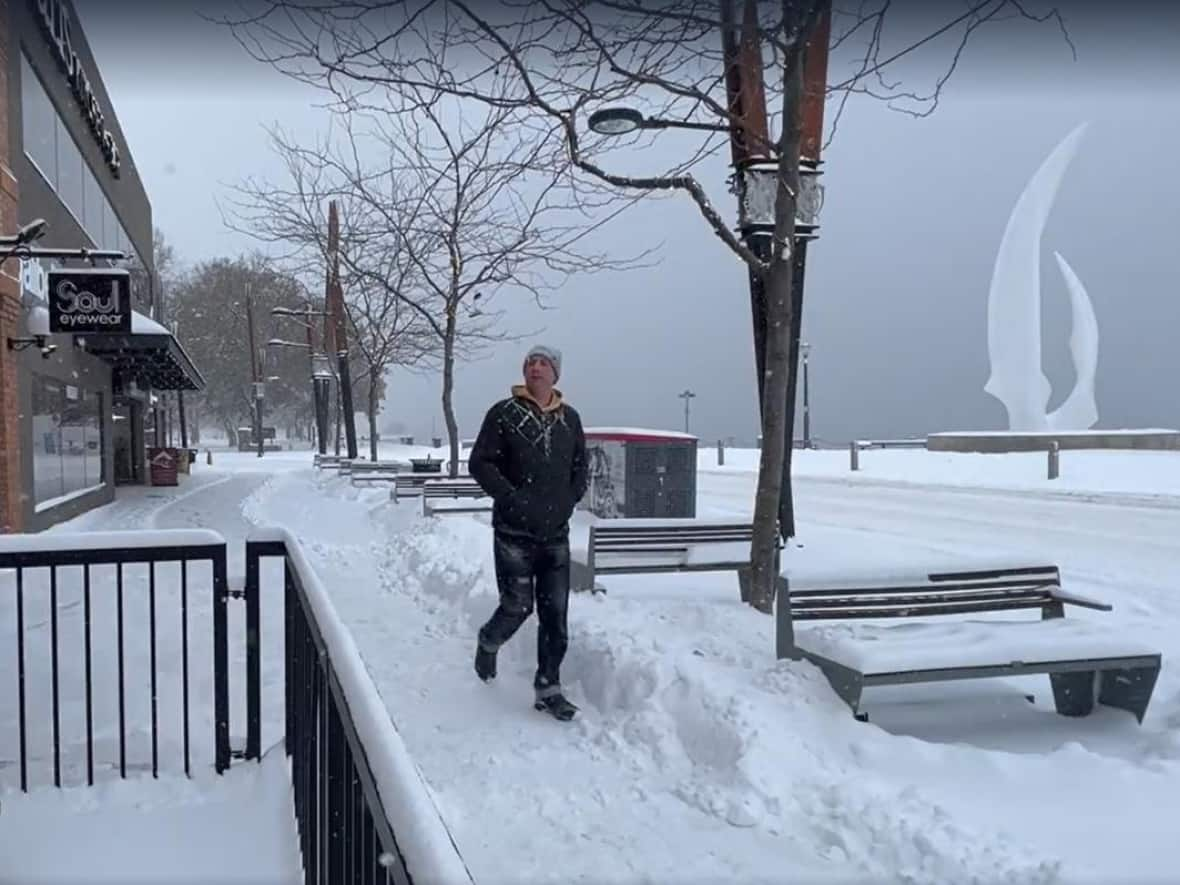
"Bitterly" cold temperatures have settled over much of B.C. this week, which is set to continue across the north and Interior on Wednesday with Environment Canada warning of "dangerous" wind chill.
Prince George is expecting overnight lows of –36 C and below –40 C with wind chill, with daytime highs of –28 C Wednesday and Thursday.
Kamloops, Kelowna and Cranbrook are forecast to record daytime highs between –20 C and –23 C Wednesday morning, with wind chill that feels like around –33 C.
Prince Rupert can expect sunny weather with a high of –8 C and wind chill that feels like –20 C.

The weather agency noted that on Tuesday morning, the coldest spot in the province was Puntzi Mountain in the Chilcotin region, where a temperature of –45 C was registered. That same spot recorded a temperature of –47 C on Monday.
Temperatures near or below –40 C with wind chill have been recorded in the Chilcotin, Quesnel, Williams Lake, Prince George, Stuart-Nechako, 100 Mile, McGregor, Yellowhead, Bulkley Valley and Lakes District areas.
The ongoing deep freeze produced several daily minimum temperature records Monday, including a low of –46.8 C west of Williams Lake, while the Quesnel area broke a record set 78 years ago when it reached a low of –37.5 C.
The extreme cold has raised particular concern for homeless people in central and northern B.C.
Risk of frostbite
Homeless people are particularly vulnerable to frostbite, says Dr. Jeff Eppler, emergency room physician at Kelowna General Hospital.
He says numbness of limbs is a warning sign of early frostbite, and people should take precautionary measures against extreme cold, including protecting themselves from exposure to wind.
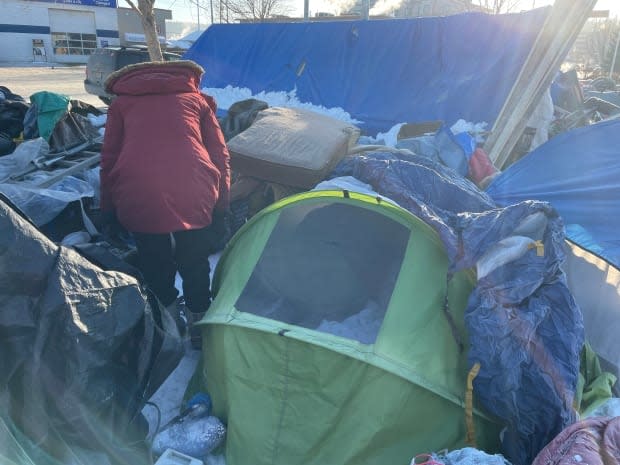
"It's really important to bundle up properly and protect any exposed skin from the wind," he said on CBC's Daybreak South.
"People should travel with warm boots and blankets, because the really dangerous thing is wind exposure — protect yourself from wind and not to touch cold surfaces."
Advocates distributed gloves and tuques and other warming supplies Monday at encampments in Prince George, where wind chill overnight made it feel as cold as –54 C.
"Random acts of kindness could save somebody's life," said Wes Mitchell, who was handing out supplies at the downtown encampment outside the Fraser-Fort George Regional District Office.
Prince George Mayor Simon Yu says the extreme cold has caught many residents off guard, and promises the city will ensure there are adequate warm indoor spaces for homeless people.
"This will be my biggest concern," Yu said. "All the warming centres are opening up, and we do have for the time being ... enough warm shelters for everybody to go to."
Seeking shelter spaces
In Kamloops, non-profit Mustard Seed's managing director Kelly Thomson says the 30-bed emergency shelter van the organization installed in the North Shore neighbourhood has been full every night.
"When they were asked, 'Would you like to come with us?' they jumped in the van and came willingly," Thomson said, who promised to find additional spaces at other shelters.
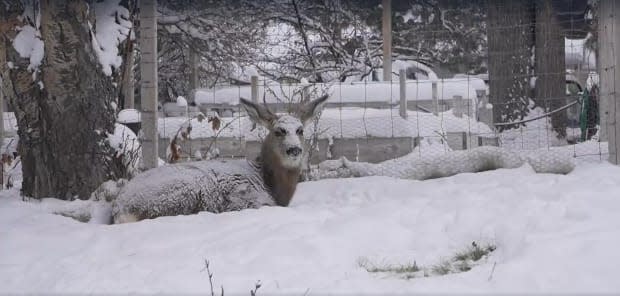
In Cranbrook, non-profits such as the AIDS Network Kootenay Outreach and Support Society have been trying to find more warm spaces for unhoused people.
Team lead Polly Sutherland says so far, the 50 shelter spaces in Cranbrook have been about enough, with only two people turned away from shelters over the past three weeks.
Sutherland says she's working with local churches to open a warming centre for homeless people.
The City of Kelowna says it has extended the operating hours of its 24-passenger emergency warming bus at the Rail Trail to 5 p.m.-9 a.m. until Saturday, when the current extreme cold weather is expected to end, and has also secured 27 insulated tents for campers.
The city's community safety director Darren Caul says bylaw officers and fire department personnel are working together with the Downtown Kelowna Association to check on people who are living outdoors in the cold weather.
"[We are] continuously distributing warming supplies, connecting people with any available beds that we might have in a shelter, and if their situation warrants, then calling emergency health services."
About 440 kilometres north of Prince George, Fort St. John Mayor Lilia Hansen says Tuesday's temperature of –30 C felt like –51 C with the wind chill — but that hasn't stopped residents's "northern spirit," with one group organizing a block party.
She adds that homeless people in the community are in urgent need of gloves, and she's asking for donations to the charities that assist them.
Flight delays, treacherous roads
Major airports in the Interior, including Kelowna and Prince George, had many of their arriving and departing flights either cancelled or delayed early Tuesday.
Kelowna International Airport director Sam Samaddar says nearly 30 flights were cancelled Tuesday morning due to low visibility and iced runways amid heavy snowfall.
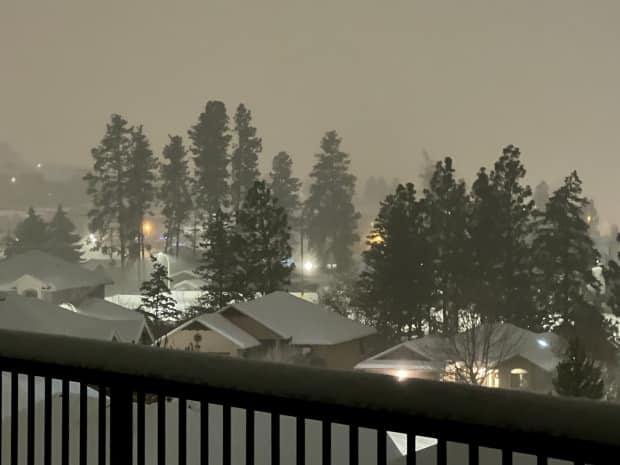
Samaddar says he fully understands passengers's frustration with flight delays and cancellations as they are eager for their holiday vacations, and he promises the airport is working closely with airlines to provide additional flights for them.
"The wild card that we never control is weather, and that's the result you're seeing," he said. "At the end of the day, we have to do things safely."
Delays at Vancouver's airport are also throwing domestic flights into disarray with people trying to get home left stranded.
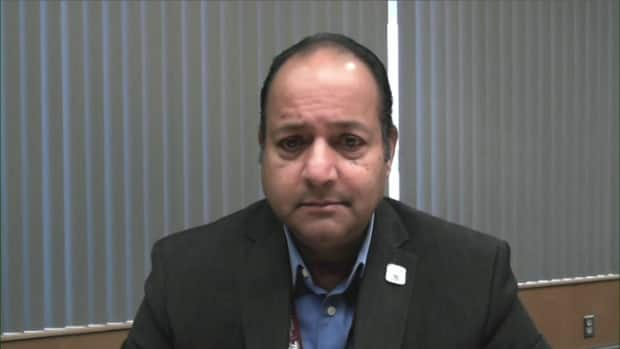
Prince George resident Carla Wainwright says her son, who studies at the University of Alberta, flew from Edmonton to Vancouver en route to Prince George, but got stuck there on Monday when his connecting flight was cancelled.
Wainwright says a good Samaritan in Prince George has promised to drive down to Vancouver to pick him up, but she's still angry with how the airline treated him.
"[There was] no hotel voucher. He did get a food voucher, but it took several hours, and really no communication. They do the bare minimum, and they do it in such a poor way."
Another Prince George resident, Rebecca Brooks, says she was stranded in Calgary on Tuesday as her connecting flight to the northern city was cancelled. She complains about not only a lack of hotel vouchers but also zero guarantees for reimbursement and a lack of help from airline staff.
Brooks says her in-laws in Prince George will drive to Calgary to pick her up — a roughly 17 hour round-trip — but she's still furious about the airline's service.
"There was nobody coming through with apologies, nobody coming through with reassurance that … there was going to be somebody helping us in the near future," she said.
For people who are considering driving in these circumstances, B.C. Highway Patrol Const. James Ward says to be mindful of the low visibility and ice on the roads.
"If you slow it down [and] give yourself a lot of distance and reactive time, you'll probably be safe," he said.
"But most importantly, you got to make sure you have the proper tires on your vehicle — summer tires and all-season tires do not cut it in this type of weather."


